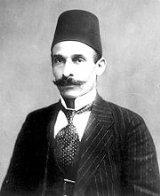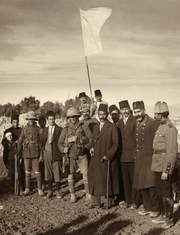
Hussein al-Husayni
Encyclopedia

Ottoman Empire
The Ottoman EmpireIt was usually referred to as the "Ottoman Empire", the "Turkish Empire", the "Ottoman Caliphate" or more commonly "Turkey" by its contemporaries...
rule of Palestine
Palestine
Palestine is a conventional name, among others, used to describe the geographic region between the Mediterranean Sea and the Jordan River, and various adjoining lands....
.
Born into the prominent Jerusalemite Arab
Arab
Arab people, also known as Arabs , are a panethnicity primarily living in the Arab world, which is located in Western Asia and North Africa. They are identified as such on one or more of genealogical, linguistic, or cultural grounds, with tribal affiliations, and intra-tribal relationships playing...
family of al-Husayni
Al-Husayni
Husayni is the name of a prominent Palestinian Arab clan formerly based in Jerusalem. Several members of the clan held important political positions such as Mayor and Grand Mufti of Jerusalem and founded and led many Palestinian Arab Islamist groups such as the Holy War Army, the Palestine Arab...
, his father Salim al-Husayni
Salim al-Husayni
Salim Effendi al-Husayni was Mayor of Jerusalem from 1882 to 1897. Hussein al-Husayni and Mousa Kazim al-Husayni, later mayors of the city, were his sons. He was a member of the Jerusalem Council and belongs to the prominent al-Husayni clan of Jerusalem. He built a palace in the city, which...
, had also served as mayor of the city.
Under Hussein's leadership, the city went through high development because he initiated the paving of roads, which ensured cleaner streets, and started construction of a sewage network project which was partly financed from Jewish communities outside Palestine
Jewish diaspora
The Jewish diaspora is the English term used to describe the Galut גלות , or 'exile', of the Jews from the region of the Kingdom of Judah and Roman Iudaea and later emigration from wider Eretz Israel....
. In an interview with the Egypt
Egypt
Egypt , officially the Arab Republic of Egypt, Arabic: , is a country mainly in North Africa, with the Sinai Peninsula forming a land bridge in Southwest Asia. Egypt is thus a transcontinental country, and a major power in Africa, the Mediterranean Basin, the Middle East and the Muslim world...
ian Al-Iqdam newspaper in March 1914, he stressed the distinction between Zionism
Zionism
Zionism is a Jewish political movement that, in its broadest sense, has supported the self-determination of the Jewish people in a sovereign Jewish national homeland. Since the establishment of the State of Israel, the Zionist movement continues primarily to advocate on behalf of the Jewish state...
, which did not threaten Palestine, and the real risk was caused from the Jewish settlers movement, and the subsequent necessity to prevent land sales to Jews. Al-Husayni also served as Director of the Red Crescent Society, established in 1915 and promoted Arab-Jewish understanding.

Muslim
A Muslim, also spelled Moslem, is an adherent of Islam, a monotheistic, Abrahamic religion based on the Quran, which Muslims consider the verbatim word of God as revealed to prophet Muhammad. "Muslim" is the Arabic term for "submitter" .Muslims believe that God is one and incomparable...
, Jewish and Christian cooperation in an attempt to create a "post-Ottoman" alternative. On December 8, 1917, after the Allied Forces led by General Allenby had conquered the city from the Ottomans, al-Husayni formally surrendered Jerusalem to the British Military Administration. He signed an official decree of surrender a few days later, handing the keys of the city gates to Allenby. A couple of weeks after the surrender in January 1918, he died. After a brief term by Aref al-Dajani
Aref al-Dajani
Aref Basha al-Dajani was an Arab Palestinian politician who served as mayor of Jerusalem during World War I.Aref al-Dajani was born in Jerusalem in 1856. During World War I, he served as mayor of Jerusalem...
, Hussein's brother Musa al-Husayni
Musa al-Husayni
Musa Kazim al-Husayni was nominated to several senior posts in the Ottoman administration. He belongs to the prominent al-Husayni family of northeastern Jerusalem...
became mayor of Jerusalem.

